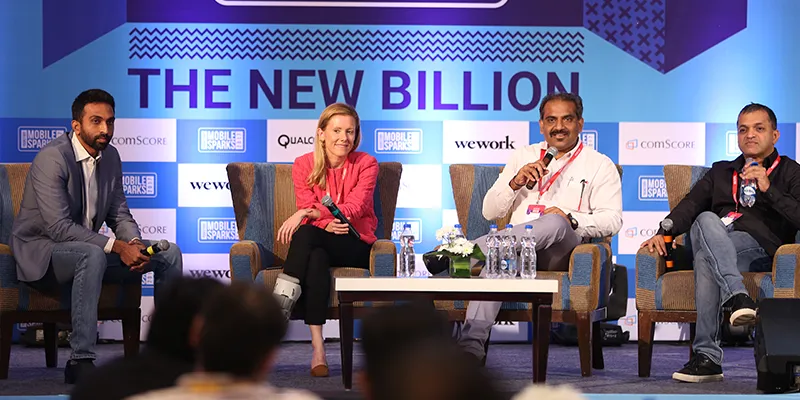'Time poor and consumption rich' - ZestMoney's Lizzie Chapman on the new billion
Demonetisation, digital transactions, and wallets, these words have made national headlines and are part of our daily parlance since a year now.
Our phones have seamlessly morphed into payment instruments, but can the same instrument be used to get the fastest credit? Taking a deep dive into how startups are turning smartphones into credit cards for the new billion, a panel discussion was organised at MobileSparks 2017.
In its sixth edition, MobileSparks 2017 focused on The New Billion. These are the people, who represent the next wave of mobile adoption.
The panelists included Bala Parthasarathy, Co-founder, and CEO, MoneyTap; Lizzie Chapman, Co-founder and CEO, ZestMoney, and Rajiv Raj, Co-founder and Director, CreditVidya. Vishal Krishna, Business Editor at YourStory moderated the session.
Alternative Credit
Bala said, “One of the reasons why I started MoneyTap was when a banker told me I have the money, and borrowers will come to me. I don't have to do much, where else will they go.” The realisation that banks were passive in their approach, was where fintech startups like MoneyTap and ZestMoney were building their niche.
Talking about the situation in China as compared with India, Lizzie said, “China is always exciting - is a young high-consumption demographic, who do not behave like their parents did. The payments and spending culture is being trashed by the new generation, which also exists in India. These people do not believe in credit cards. They think credit cards are bad, ugly, and highly expensive. They embrace products which are faster, easier and less cumbersome.”
She added that users today are “Time poor and consumption rich.”

Some of the bigger challenges that were highlighted in the discussion were lack of data, people not having a sound financial record, collection mechanism, issues relating to underwriting, and regulations, among others.
Besides the data, there are innumerable regulatory aspects that one needs to adhere to before getting credit, which includes the KYC, and number of checks before final sanction of an amount. Fintech lenders usually capitalise on the same.
“Aadhaar is part of the solution, but it's not the solution, things like UPI are helping, but not fully,” Rajiv said.
Pushing the boundaries
As most startups peg on small ticket loans with borrowers mostly in the age group of 25-35 years, Rajiv said, “As one has a lot of information of the population today, if one understands the reason for default, they can lend more.”
“One should start working with some of the progressive banks and work towards it, but it will take time,” Bala said. MoneyTap’s model is primarily bank-lend as it has collaborated with multiple banks, with RBL Bank being its launch partner.
Banks' partnerships with startups can make it a win-win for both.
Adding to what banks are looking at, Rajiv said, “How to source the customers, the operational cost of sourcing or underwriting, and how does one reduce the delinquency are the prime areas banks look at.”
“If startups can underwrite the loan and if banks put their amounts, then we are unlocking the 45 crore population,” he added.
Building user-centric and customised solutions were among the other pieces of advice shared by the panelists.







